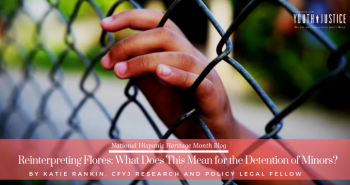Reinterpreting Flores: What does this mean for the detention of minors?

In recognition of Hispanic Heritage Month, the Campaign for Youth Justice is supporting a series on the impact of federal and state youth justice policies and practices and their disparate impact on Latinx families. This is the second blog in our series.
By Katie Rankin, CFYJ Research and Policy Legal Fellow
On September 18, the Senate Committee on Homeland Security and Government Affairs held a hearing on The Implications of the Reinterpretation of the Flores Settlement Agreement for Border Security and Illegal Immigration Incentives. The Flores Agreement sets forth a policy that requires immigrant children be released from detention to a parent, guardian, relative, or a designated party without delay. The agreement also sets forth standards on conditions for facilities in cases where a child cannot be released to a parent or guardian. Critics believe that this agreement creates incentives, or loopholes, for minors and family traveling with minors to cross the border illegally because minors must be treated differently.
Although the Flores Agreement focuses on protecting children, the focus of the hearing was mainly on protecting the border--not protecting the welfare of minors crossing the border. Witnesses discussed the backlog of cases waiting for immigration court, the absconding rate of those on the non-detainee docket, and the shortage of resources. Some alternative solutions were suggested in lieu of building family detention facilities, such as additional judges, lawyers, and the implementation of case management and electronic monitoring. Eventually the conversation was redirected to the true reason of the Flores Settlement Agreement, avoiding the unnecessary detention of minors.
Senators repeatedly cited that prolonged detention causes mental and physical harm to children. Witnesses, including Matthew Albence, Executive Director of U.S. Immigration, Customs Enforcement; Robert Perez, Acting Deputy Commissioner of U.S. Customs Border Protection; and Joseph Edlow, acting Deputy Assistant Attorney General of U.S. Department of Justice, were asked if they were aware of this fact, and what actions were being taken to prevent this harm to immigrant children. They could not give a direct answer to this question; an alarming discovery because the well-being of immigrant minors is the entire purpose of the Flores Agreement.
As Congress debates how best to treat immigrant youth who cross the border, it’s important to remember that many of the concerns that arise from the detention of immigration youth are also a concern for minors in the juvenile and adult criminal justice system. Prolonged detention causes mental and physical harm to ALL children. Placing youth in detention puts them at a greater risk for self-harm, mental illness, and falling behind in school. The effects of detention are even worse for children who are confined in adult jails and prisons, which puts them at a higher risk for sexual assault and rape, mental illness, and suicide.
In order to protect kids in the adult criminal justice system, sight and sound separation is required under federal law under the Youthful Inmate Standard of the Prison Rape Elimination Act and the Juvenile Justice and Delinquency Prevention Act (JJDPA). To comply with sight and sound separation youth may not have sight, sound or physical contact with an adult inmate. The Youthful Inmate Standard also states that best efforts must be made not to place youth in solitary confinement to achieve this standard; unfortunately that seems to be the case all too often. Pending legislation to reauthorize the JJDPA would increase these protections by requiring kids awaiting trial in the adult criminal justice system to be removed from adult facilities.
Some policymakers recommend that the Flores Agreement should be reinterpreted to allow the detention of youth with their families at the border, in order to deter the “incentives” and close “loopholes” that pull people to cross the border. Not only could this lead to the indefinite detention of minors as they wait for their immigration case to proceed, but it would also contradict the Youthful Inmate Standard and the JJDPA. Rather than spending millions on building jails to detain minors, we should invest our resources to connect them with family, and set up case management for their trial. The bottom line is that all children belong in communities and with their family.

